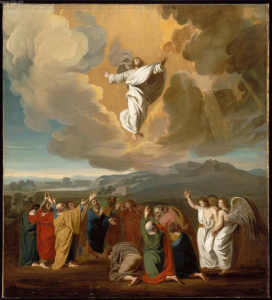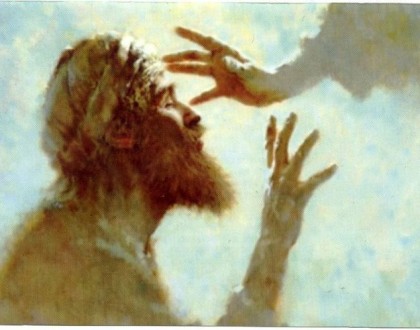Ascension of our Lord, Year B – Sunday, May 17, 2015

Ascension of our Lord, Year B – Sunday, May 17, 2015
The angels’ words to the “men of Galilee” in the first reading from the Acts of the Apostles for the Feast of the Ascension of the Lord (1:1-11) are painfully blunt and leave little room for misinterpretation: “Why do you stand here looking up at the skies? This Jesus who has been taken from you will return, just as you saw him go up to the heavens.”
Jesus’ disciples are given a last bit of instruction. “Don’t keep trying to stare into the future. Don’t be overly concerned about which hour he will come back.” We must not stand idly staring up into the heavens and moaning about the past, about which we can do nothing, except to bury it deeply in God’s hands and heart! The Lord will be glorified, and it follows that his disciples will also share in his glory.
As Jesus disappeared, he didn’t simply dissolve into thin air. On the day of his Ascension, one might conclude that Jesus removed himself into a new form of divine exclusion. The case is exactly the opposite. In God, Jesus is “here” in a new and very specific way. Only in his physical separation from the historical scene can his spiritual union with all the world, for all time be complete. Jesus left the world one day in order to be available to all people throughout all time. He had to dissolve bonds he had made with his friends, in order to be available for everybody. In Jesus, the future has already begun!
The Ascension according to Mark’s account
There are similarities in the reports of Jesus’ Ascension found in the Synoptic Gospels — Mark, Matthew, and Luke. In each case, Jesus assigns his disciples the task of proclaiming the gospel message to the entire world.
In the Gospels of Mark and Matthew, the disciples are sent by Jesus to baptize and to preach. In Luke’s Gospel, however, the commission to baptize is not found. Instead, Jesus directs the disciples to return to Jerusalem to await the fulfillment of his promise to send them the Holy Spirit. Only the Gospels of Mark and Luke actually report Jesus’ ascension into heaven. Matthew’s Gospel concludes with Jesus’ promise to remain with his disciples forever.
In the commission that Jesus gives to his disciples, there are elements that are quite typical of Mark’s Gospel. The signs that will accompany belief in Jesus are as distinct as the action performed by Jesus during his ministry. Those who believe in Jesus will be empowered to do what Jesus himself has done.
During his ministry, Jesus sent his disciples to preach, to heal, and to drive out unclean spirits. Now they are sent again to do these things and more. From his place with God in heaven, Jesus helped his disciples, and he continues to help us as we try to live as his followers.
Only the Gospel of Mark notes that Jesus ascended to sit at the right hand of God. In noting this, Mark teaches that Jesus’ ascension affirms the glory Jesus received from God after his death and resurrection.
The desire for heavenly realities …
Just as the Risen Lord entrusted himself into the hands of such pathetic, broken people who were with him, he does the same to us. Our own brokenness and sinfulness are so overpowering at times that we forget that this incredible commissioning is possible, even for poor, weak people like us! How often do we marvel at the fact that Christ could truly inhabit us and act through our bodies, minds and hearts, and yes, even through the Church!
We know that we move toward heaven to the extent that we approach Jesus. We are assured that he hasn’t ever stopped being present with us throughout all time. The mysterious feast of the Ascension reminds us that Christ accepts our lack of confidence in ourselves. He accepts the shadowy and dark areas of our humanity. He accepts our capacity for deceit, betrayal, greed and power. And having accepted us, he calls us, gives us the eternal commission to be his people, and sends us to serve him and love him, in spite of ourselves and because of ourselves.
John Henry Cardinal Newman said it well long ago:
“He calls us again and again, in order to justify us again and again –
and again and again, and more and more,
to sanctify and glorify us.
It were well if we understood this;
but we are slow to master the great truth,
that Christ is, as it were,
walking among us, and by his hand, or eye, or voice,
bidding us follow him.”
Let’s get going and carry a piece of heaven into the world. This is the meaning of the Resurrection and the Ascension of our Lord, not one of divine abandonment of the human cause, but divine empowerment of the Gospel dream! May Christ’s dying and rising move us to make God’s glory dwell on earth. May our hope for the future inspire us in a respect for the present moment. May the desire for the heavenly realities not make us neglect our work on earth.
Recent Sermons

Easter Sunday – The Resurrection
April 14, 2017

4th Sunday of Lent Year A – The Man Born Blind
March 27, 2017

3rd Sunday of Lent Year A – The Samaritan Woman at the Well
March 20, 2017

